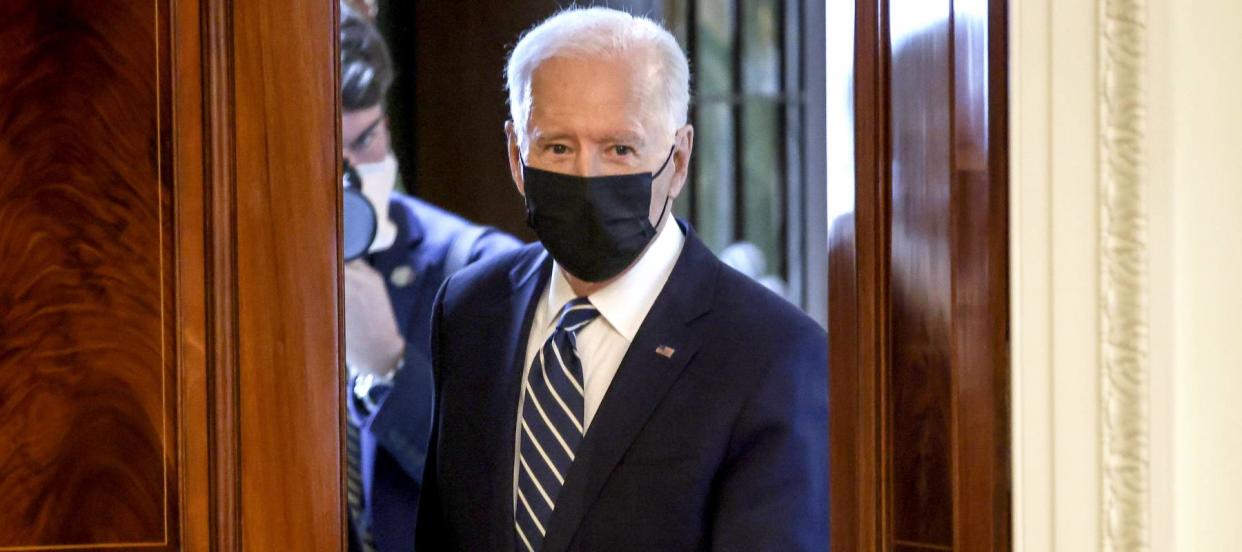Fourth stimulus check: Biden urged to add payments to infrastructure plan

As millions of Americans still wait for their third stimulus check, momentum seems to be building over the idea of a fourth round of cash payments to help households and the U.S. economy recover from the pandemic.
More than 75 members of Congress are pressing President Joe Biden to support a fourth stimulus check and more after that, because they say many Americans are still struggling after a year of crisis. Biden is being urged to include recurring aid payments in the $2 trillion infrastructure spending plan he's unveiling Wednesday.
Online searches for the phrase "fourth stimulus check" have mushroomed over the past few weeks, according to Google Trends, and one economist says another payment is "certainly possible."
Will you get another "stimmy"? Here's where things currently stand.
Lawmakers: Families need more stimulus checks

More than 50 Democratic U.S. representatives and 21 members of the Senate have signed letters urging the Biden administration to back regular stimulus checks for as long as the coronavirus crisis endures. Neither pitch gives a dollar amount, though several of the lawmakers have spoken in favor of $2,000 payments.
The senators say recurring checks should be part of the president's infrastructure plan to help the economy with new spending, including on roads and bridges. "Recurring direct payments have wide support from both the general public and economic experts," the senators write.
In their letter, 56 House members say the latest, $1,400 stimulus checks aren't enough to help Americans who are still having difficulty paying for basic necessities. "To truly build back better, families need stability and certainty through ongoing relief," the lawmakers write.
Many Americans have used their aid money for groceries, rent and other basic needs, according to a U.S. Bureau of Labor Statistics study based on how last year's first, $1,200 stimulus checks were spent.
The cash also has gone toward saving, investing and other expenses, the BLS found. Some consumers have likely used their money to buy affordable life insurance, because demand for those policies has surged amid the pandemic.
Checks 'possible,' but opposition likely
"More direct stimulus payments are certainly possible," says Peter Earle, an economist at the American Institute for Economic Research. He was interviewed by Acorns, an app that allows you to grow your investing using spare change.
But further checks would have no shortage of detractors. Republicans opposed the third checks as expensive and unnecessary, and moderate Democrats may feel that way about any further payments. They demanded changes for the third round, to "target" the stimulus checks toward the neediest Americans.
The $1.9 trillion COVID rescue package President Biden signed March 11 was approved using an arcane budget process that allowed the Democrats who control Congress to pass the legislation with simple majorities. Typically, bills need a 60-vote supermajority to make it through the Senate, because of the "filibuster rule."
Biden and the Democrats can use the streamlined, go-it-alone approach just one more time in 2020, and they'd have to wait until the next fiscal year starts on Oct. 1 to do that.
It's not clear whether the White House plans to play its remaining wild card for the new infrastructure bill, or whether the president would be open to the idea of rolling a fourth stimulus check — and maybe more — into the package.
What if you think you'll need more relief?

If you’re anxiously waiting for your third stimulus check — or it's already gone — and you're worrying about how you'll get by later in the year, you have some options to find more cash.
Cut costly interest charges. Have you been leaning hard on your credit cards through the pandemic, and piling up interest? Make your debt more manageable — and pay it off more quickly — by folding your balances into a lower-interest debt consolidation loan.
Make savings your policy. Car insurance companies have been doling out discounts for drivers who have been using their cars less because of COVID. If yours won’t offer savings, shop around for a better deal. And while you’re at it, comparing rates on homeowners insurance could save you hundreds of dollars a year.
Refinance your mortgage (if you've got one) and slash your payments. Mortgage rates remain historically low, and refinancing your existing home loan could reap big savings. The mortgage technology and data provider Black Knight says 11.1 million mortgage holders are still sitting on loans worth refinancing — for average savings of $277 a month.
Trim your budget and "make your own" stimulus check. Using a few creative ways to cut back, you might come up with the equivalent of a monthly stimulus check. Contact your cellphone provider and switch to a cheaper option. Have a hobby or special talent? Turn it into a side hustle to bring in extra income. And, download a free browser extension that will automatically scour for better prices and coupons whenever you shop online.
